According to Soocial, a popular branding agency, 75% of businesses conduct exit interviews, but only 1% of them do it the right way. The biggest culprit responsible for this worrying number is the inability of the companies to ask the right exit interview questions.
Many exit interview questions remain surface-level or generic rather than focusing on meaningful questions that probe deeper into the reasons for an employee’s departure or reveal patterns of dissatisfaction.
To help you avoid this situation, we have compiled 100+ best exit interview questions that reveal genuine employee concerns and underlying reasons for turnover. But first, let’s cover the basics.

What is an Exit Interview?
Exit interviews are brief conversations or surveys conducted with an employee who is departing the organization. It is a way for the company to learn why the employees are leaving the organization and take corrective measures to improve the retention of current employees.
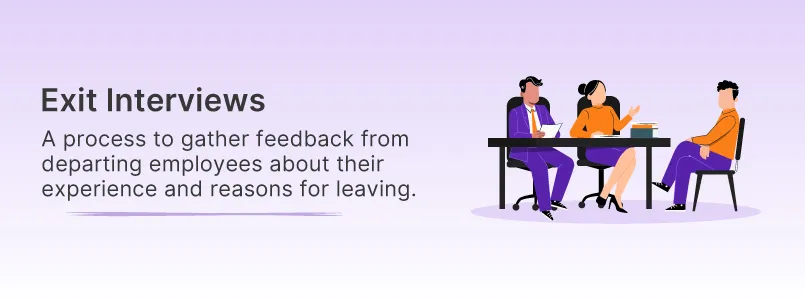
Exit interviews can be conducted via different channels, including in-person, telephone, paper, or even online. It is typically conducted by the human resources department of the company.
A traditional exit interview would go like this
- The company arranges the exit interview at a convenient time before the employee’s last day.
- The company selects an unbiased interviewer, such as an HR representative or an external consultant for the exit interview.
- The exit interview questions are modified if needed based on the type of role
- The interviewer makes the employee feel at ease by starting with a friendly conversation. They also explain the purpose and confidentiality of the interview.
- The interviewer asks the questions in a conversational tone. They also actively listen and encourage the employee to provide detailed responses.
- Simultaneously, the interviewer records the employee’s answers accurately either through note-taking or audio recording (with permission).
- The company analyzes employee feedback to identify common themes, patterns, and areas that require attention or improvement.
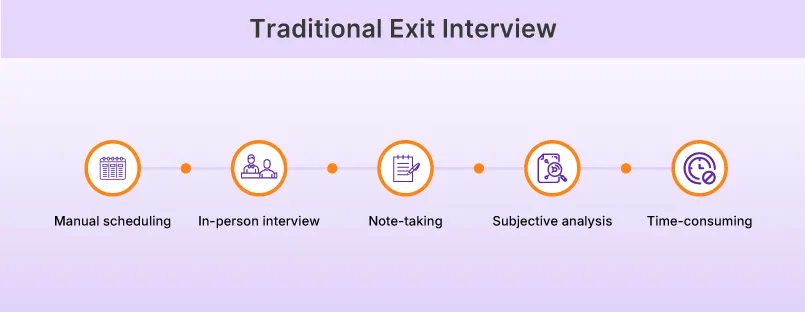
As you can see, the entire process used to be manual with human intervention at multiple touchpoints. This demanded time and resources from the company. Today’s feedback tools automate most of the above tasks. Here is a typical workflow of these tools in conducting an exit interview
- The feedback tool schedules the exit interview by sending out invitations and reminders based on the employee’s departure timeline.
- It generates role-specific questionnaires, either from pre-set templates or customized based on the employee’s role and experience
- Employees receive a secure link to access the exit interview questionnaire through an intuitive interface on the tool.
- The tool presents questions in an interactive format, such as surveys or chatbots, that guide employees through the interview process.
- As employees answer questions, responses are collected and stored in real time by the tool.
- The tool uses built-in analytics to process and analyze the collected data, identifying trends, common themes, and valuable insights.
- Insights and recommendations from the exit interviews are integrated into the company’s continuous improvement processes.
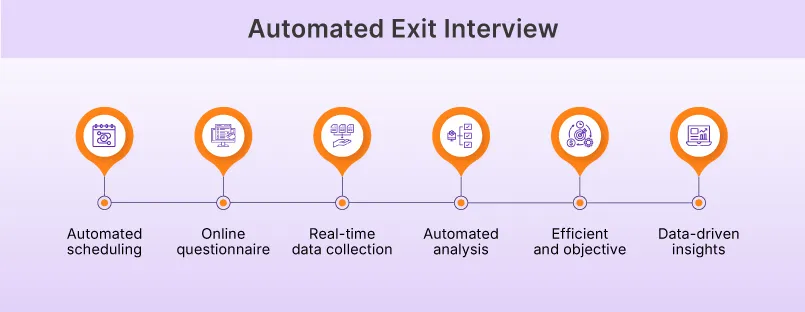
Why Conduct Exit Interviews?
Here are some common reasons to conduct exit interviews:
1. Boosts Brand Reputation
Conducting exit interviews demonstrates your company’s commitment to listening and learning from its employees, even when they are leaving. This approach reflects positively on the organization’s culture. It enhances your brand reputation as a responsive and caring employer. This, in turn, can attract top talent and improve overall employee engagement.
2. Identify and Address Key Areas of Improvement
Exit interviews tell you why employees are leaving your organization. It could be dissatisfaction with compensation, management practices, or career growth opportunities. Either way, by understanding the actual reason and in turn, the areas you can improve, you can address it before it starts worsening your attrition rates.
3. Improve Workplace Culture
Feedback from exit interviews can reveal aspects of the workplace culture that need enhancement, such as a lack of collaboration, poor communication, or issues with inclusivity and diversity. By identifying these cultural gaps, you can take steps to create a more positive and engaging environment that focuses on employee well-being and productivity.
4. Reduces Costs of Turnover
The costs associated with turnover, including recruitment, onboarding, training, and lost productivity, are substantial. According to one study, the cost of replacing an employee can range from half to four times the employee’s annual salary. Exit interviews help organizations identify the underlying causes of turnover at the right time and implement strategies to retain employees longer. This automatically reduces attrition costs and ensures a more stable workforce.
Now that we’ve covered the basics, let’s look at 100+ exit interview questions you can use right away!
100+ Best Exit Interview Questions You Should Ask
Here are some of the most impactful exit interview questions you can ask your departing employees
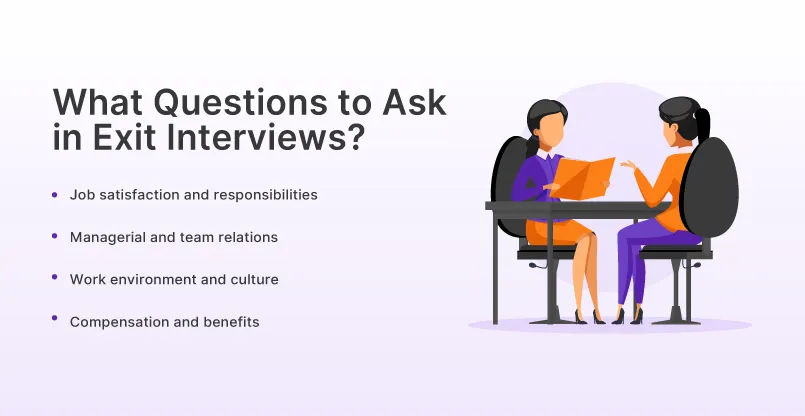
Job Satisfaction and Responsibilities
These exit interview questions focus on evaluating:
- Employee’s day-to-day experience
- Their sense of fulfilment in their role
- Whether their duties were manageable and aligned with their skills and interests.
These questions are crucial because they provide insights into how your departing employees feel about their roles and whether their expectations align with their actual experiences. This can reveal key factors that influenced their decision to leave, such as lack of motivation, inadequate resources, or unfulfilled career aspirations.
Additionally, exploring their responsibilities can help identify any discrepancies between what was promised and what was delivered in the role. This, in turn, sheds light on areas where job descriptions or expectations may need adjustment.
Here are the key questions to ask under this exit interview category:
✅ What did you enjoy most about your job?
✅ What did you enjoy least about your job?
✅ Were your job responsibilities clearly defined?
✅ Did your job role align with your expectations?
✅ Were there any tasks or responsibilities you felt were unnecessary?
✅ How challenging was your job on a day-to-day basis?
✅ Did you feel your workload was manageable?
✅ Did you have the resources you needed to do your job effectively?
✅ Did you feel empowered to make decisions in your role?
✅ How satisfied were you with your job overall?
Managerial and Team Relations
These exit interview questions aim to assess:
- The quality of leadership
- The effectiveness of teamwork within the organization.
- Strengths and weaknesses in managerial approaches and team dynamics
These questions are the key to building a more supportive, collaborative, and engaging work environment. They provide insights into the dynamics between the departing employee, their direct supervisors, and their colleagues. Positive relationships with managers and team members are often critical factors in employee retention and overall job satisfaction.
By understanding how well your employees felt supported by their managers, you can pinpoint areas where managerial practices may need improvement. Support could include anything from receiving constructive feedback to receiving opportunities for professional growth.
These questions can also uncover issues such as lack of collaboration, poor communication, or interpersonal conflicts that may have contributed to an employee’s decision to leave.
Here are the key questions to ask under this exit interview category:
✅ How would you describe your relationship with your direct manager?
✅ Did you receive adequate support from your manager?
✅ How would you rate the communication between you and your manager?
✅ Were you given regular feedback on your performance?
✅ Was your manager receptive to your feedback?
✅ Did you feel your manager treated all team members fairly?
✅ How would you describe your relationship with your colleagues?
✅ Was there a collaborative atmosphere within your team?
✅ Did you feel like a valued member of your team?
✅ Were there any conflicts or issues with team dynamics?
Work Environment and Culture
These exit interview questions focus on understanding how the organizational atmosphere :
- Affects employee morale
- Impacts employee productivity
- Has consequences on employee well-being
The work environment, encompassing both the physical space and the organizational culture, plays a significant role in employee retention. These questions provide a window into the everyday experiences of employees and how these shape their overall satisfaction and engagement.
Feedback on the work environment can reveal issues like inadequate resources, lack of flexibility, or concerns about safety. Similarly, insights on culture can highlight whether the organization’s values, norms, and behaviors align with what employees experience daily.
Ultimately, by acting on the response to these questions, you can offer better work-life balance and ensure that organizational values are genuinely reflected in everyday practices.
Here are the key questions to ask under this exit interview category:
✅ How would you describe the company culture?
✅ Did you feel the company culture aligned with its stated values?
✅ Did you feel included and respected in the workplace?
✅ Were there any issues with workplace morale?
✅ How would you describe the communication within the company?
✅ Did you feel safe and comfortable in the work environment?
✅ Were there adequate diversity, equity, and inclusion efforts?
✅ Did the company support a healthy work-life balance?
✅ Were you encouraged to participate in company events or activities?
✅ How satisfied were you with the workplace environment overall?
Compensation and Benefits
These exit interview questions are aimed at evaluating whether your organization’s compensation and benefits offerings:
- Meet industry standards
- Meet the needs of your employees.
- Are attractive to current and future employees
Compensation is often a major factor in an employee’s decision to leave. Insights into how employees perceive their pay, bonuses, health benefits, retirement plans, and other perks can reveal if they feel adequately rewarded for their contributions.
Understanding dissatisfaction in this area can help you identify gaps in their compensation strategies, which may be driving turnover.
Here are the key questions to ask under this exit interview category:
✅ How satisfied were you with your salary?
✅ Did you feel your compensation was competitive with the market rate?
✅ Were you aware of the company’s compensation and benefits policies?
✅ How satisfied were you with the employee benefits offered (e.g., health, retirement, PTO)?
✅ Were there any benefits you felt were lacking or inadequate?
✅ Did you feel the performance appraisal and rewards system was fair?
✅ Were you satisfied with any bonuses or incentives provided?
✅ Did you feel valued and fairly compensated for your work?
✅ How could the company improve its compensation and benefits offerings?
✅ Did compensation play a role in your decision to leave?
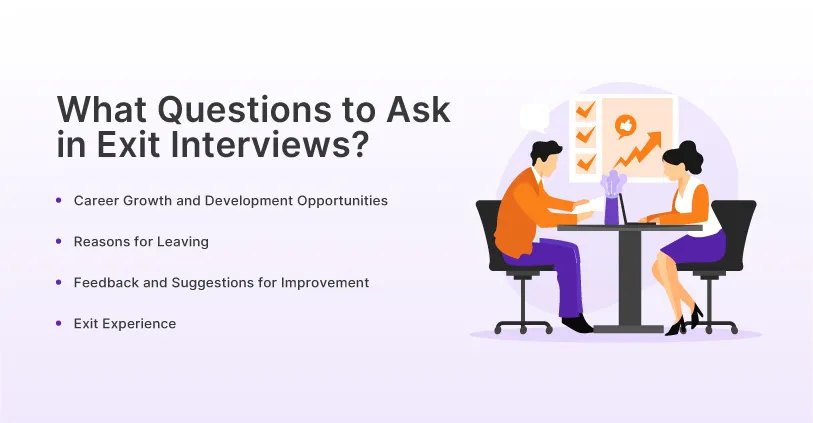
Career Growth and Development Opportunities
These exit interview questions aim to assess whether the organization provides:
- Clear pathways for career progression
- Sufficient opportunities for development
- Enough training programs, mentorship opportunities, and a motivating environment that encourages long-term employee commitment.
Understanding how employees perceive their chances for advancement, skill-building, and access to learning resources can reveal if your company is effectively creating an environment where growth is encouraged. These questions provide insight into whether employees feel their professional aspirations are being supported by the organization or not. If employees feel stagnant or that their potential is not being recognized, they may choose to leave in search of better opportunities elsewhere.
Here are the key questions to ask under this exit interview category:
✅ Did you feel there were opportunities for career growth within the company?
✅ Was professional development (e.g., training, workshops) encouraged?
✅ Have you had regular conversations about career development with your manager?
✅ Were you given opportunities to take on new challenges?
✅ Did you feel supported in your professional goals?
✅ Were there sufficient opportunities for promotion?
✅ Did you receive adequate mentorship or coaching?
✅ Did the company offer clear career progression paths?
✅ Was there enough focus on skill development?
✅ Did a lack of career growth contribute to your decision to leave?
Reasons for Leaving
This type of exit interview questions focuses on:
- Uncovering the primary causes behind an employee’s exit
- Finding out if a competitor is offering better pay to them
- Probing into any particular incident that triggered them to take this step
These questions help you understand the specific factors that led to an employee’s decision to resign. These questions provide direct insights into whether the departure was influenced by issues such as lack of growth opportunities, job dissatisfaction, inadequate compensation, poor management, or personal reasons.
Understanding these motivations will help you identify trends and recurring problems that may contribute to turnover, enabling you to make necessary improvements.
Here are the key questions to ask under this exit interview category:
✅ What prompted you to start looking for another job?
✅ Was there a specific incident that influenced your decision to leave?
✅ Was there anything that could have been done to prevent your departure?
✅ Were you satisfied with the feedback you received on your performance?
✅ Did you receive any counteroffer from the company when you announced your departure?
✅ Did you feel undervalued or unappreciated in your role?
✅ Were there any unresolved issues that led to your decision?
✅ Did you find the company’s goals or vision no longer aligned with yours?
✅ Did you feel like you had reached your potential here?
✅ Did you experience any issues related to company policies or practices?
Feedback and Suggestions for Improvement
These exit interview questions focus on:
- Encouraging open dialogue and empowering employees to contribute positively to the organization’s future, even as they exit.
- Gather actionable insights on potential areas for improvement, whether in leadership approaches, team dynamics, resource allocation, or company policies
- Helping you make data-driven decisions that can improve retention and create a more supportive and engaging workplace.
These questions are important because they provide departing employees with an opportunity to share their honest opinions and constructive feedback about their experiences within the organization. They can uncover specific areas where processes, policies, or practices may be failing and identify changes that could enhance overall employee satisfaction and productivity.
By asking for suggestions directly from employees who are leaving, you gain unique insights that might not surface through regular employee engagement surveys or internal feedback mechanisms.
Here are the key questions to ask under this exit interview category:
✅ What changes would you suggest to improve the workplace?
✅ Are there any policies or practices you feel should be reviewed or changed?
✅ How could the company improve its employee engagement efforts?
✅ Do you have any feedback for the senior management team?
✅ What can the company do to enhance the employee experience?
✅ What would have convinced you to stay at the company?
✅ Are there any resources or tools that would have helped you in your role?
✅ How could the company improve the onboarding process for new employees?
✅ What advice would you give to the person filling your position?
✅ How do you think the company can reduce turnover?
Exit Experience
These exit interview questions focus on:
- Evaluating the quality and smoothness of the offboarding process
- Finding out whether the offboarding process is respectful, well-organized, and positive.
- Identifying any means to refine the offboarding procedures to leave a lasting, positive impression
These questions are important because they help you understand how your employees perceive the final stage of their employment journey. This includes the resignation process, communication with management and HR, the effectiveness of the offboarding process, and the overall fairness and professionalism experienced during their departure.
Understanding the exit experience is crucial because it can influence the departing employee’s final impressions of the company. This, in turn, may affect their likelihood to recommend your organization to others or even consider returning in the future.
Here are the key questions to ask under this exit interview category:
✅ How would you describe the offboarding process?
✅ Was your decision to leave handled professionally and respectfully?
✅ Were you able to transition your responsibilities smoothly?
✅ Were there any issues during the exit process?
✅ Did you receive all the necessary information about your final paycheck and benefits?
✅ Were there any difficulties in wrapping up your projects?
✅ Was your resignation treated confidentially?
✅ Did you feel your concerns or feedback were heard during the exit process?
✅ How likely are you to recommend this company to others?
✅ Would you consider rejoining the company in the future?
Open-Ended and General Questions
Exit interview questions that are open-ended and general are essential because they give departing employees the freedom to express their thoughts, experiences, and insights without being restricted by specific prompts. These types of questions encourage employees to share any additional feedback or concerns that may not have been covered in the more targeted sections of the interview.
Open-ended questions can also reveal unexpected issues, provide a deeper understanding of the employee’s overall experience, and highlight areas for improvement that may not have been previously imagined.
Here are the key questions to ask under this exit interview category:
✅ Is there anything else you would like to share about your experience with the company?
✅ What did you like most about working here?
✅ What did you like least about working here?
✅ What are your future career plans, and how does this new opportunity align with them?
✅ Do you have any final comments or suggestions for the company?
Bonus: Exit Interview Questions by Role
These questions provide role-specific questions that are designed to extract feedback from employees based on their particular job functions. By targeting questions to specific job categories—such as interns, technical roles, and managers—you can gain deeper insights into the factors affecting job satisfaction and performance in each role.
Here are the key questions to ask for different types of roles:
Exit Interview Questions for Interns
✅ What were your primary learning objectives during your internship, and do you feel they were met?
✅ How effective was the onboarding process in helping you understand your role and responsibilities?
✅ Can you describe your experience with mentorship or supervision during your internship?
✅ What challenges did you face in your role, and how could the internship program be improved to address these challenges?
✅ How would you rate the overall support and resources provided to you during your internship?
Exit Interview Questions for Technical Roles
✅ How well did Tool X support your daily tasks and project requirements?
✅ Can you provide feedback on the effectiveness of the technical team’s collaboration and communication?
✅ Were there any specific technical challenges or bottlenecks you encountered that impacted your performance?
✅ How satisfied were you with the opportunities for skill development and training in your role?
✅ What improvements could be made to the technical processes or resources to enhance productivity and job satisfaction?
Exit Interview Questions for Managers/Leaders
✅ How effective was the support you received from senior leadership and other departments in achieving your goals?
✅ Can you provide feedback on the decision-making processes and how they impacted your ability to lead your team?
✅ How satisfied were you with the resources and support available for managing your team and driving performance?
✅ What were the key challenges you faced in your leadership role, and how could the organization address these issues?
✅ How well did the organization’s strategic goals align with your team’s objectives and your own leadership approach?
If you’re looking for an easier way to conduct exit interviews, we’ve got just the right thing. Check out our fully customizable exit interview Google form that you can download right away!

Exit Interview Tips and Best Practices
Here are some best practices you can follow while conducting your next exit interview
Prepare in Advance
Preparation is key to conducting effective exit interviews. Here are certain steps you can take to prepare for the exit interview:
- Familiarize yourself with the employee’s role, tenure, and any previous feedback or performance reviews.
- Develop a list of relevant questions tailored to their specific position and experiences.
- Ensure you understand the goals of the interview.
Such a level of preparation helps you ask insightful questions and facilitates a more productive conversation.
Choose the Right Timing
Timing can directly impact the quality of feedback you receive. Schedule the exit interview towards the end of the employee’s notice period. This will allow them to reflect on their entire experience without the pressure of immediate departure. Also, ensure the timing is convenient for both parties to encourage candid and thoughtful responses.
Create a Comfortable Environment
Make the exit interview setting as comfortable and relaxed as possible. Choose a neutral, private space where the employee feels safe to speak openly. A supportive and non-threatening environment encourages honest feedback and helps build trust.
Use a Structured Format
While flexibility is important, having a structured format for the exit interview ensures that all critical areas are covered. Use a consistent framework for asking questions. But remain open to exploring topics that arise spontaneously. A structured approach helps gather comprehensive and comparable data across different interviews.
For example, here is a possible format for the exit interview:
- Welcome the employee
- Explain the purpose of the exit interview
- Ask all the right questions arranged in the order discussed in this article
- Request any specific suggestions they have for improving the company.
- Ask what changes could have motivated them to stay.
- Ask if they are open to staying in touch for future opportunities.
- Provide another opportunity to share any final thoughts or additional feedback.
- Thank them for their time and contributions.
- Reiterate confidentiality and the importance of their feedback.
- Offer best wishes for their future endeavors
Ensure Confidentiality
A Workplace Insights survey says that the top reason employees decline to attend exit interviews is that they fear the confidentiality of the interview will not be maintained. So assure employees that their responses will be kept confidential and used solely to improve organizational practices. Confidentiality encourages honesty and helps employees feel secure in providing candid feedback without fear of repercussions.
Listen Actively
Active listening involves fully concentrating on the employee’s responses and acknowledging their feelings and perspectives. Show empathy, ask follow-up questions for clarification, and avoid interrupting. This approach not only gathers valuable information but also demonstrates respect for the employee’s input.
Avoid Defensiveness
Maintain a neutral and non-defensive stance during the interview. Employees may share criticisms or negative feedback, and it’s crucial to approach these comments without becoming defensive or argumentative. Focus on understanding their perspective and use their feedback constructively.
Seek Constructive Feedback
Encourage employees to provide specific suggestions for improvement. Constructive feedback is invaluable for identifying areas where the organization can enhance its practices, policies, or work environment. Ask for actionable recommendations that can drive meaningful changes.
Document and Analyze Insights
Accurately document the feedback received during the exit interview. Analyze the collected exit interview data to identify common themes, patterns, and areas for improvement. Regularly reviewing and acting on these insights helps address issues and improve employee retention and satisfaction.
Choose the right tool
Select an appropriate tool or platform for conducting and managing exit interviews. A platform like Peoplebox facilitates a smooth and efficient process for both the interviewer and the employee. It can also streamline analysis and follow-up actions.
Unlock Employee Voices with Peoplebox
Peoplebox is an advanced employee engagement platform designed to help you capture and analyze valuable feedback from your team. With Peoplebox, you can gain real-time insights into employee satisfaction, track engagement levels, and identify areas for improvement.
Peoplebox also facilitates ongoing feedback loops, enabling you to gather actionable data on employee experiences and perceptions. Its powerful analytics tools allow you to uncover trends, address issues proactively, and implement necessary changes that enhance your organizational culture. Want to know more about how Peoplebox can help streamline your exit interview process? Request a demo now.







